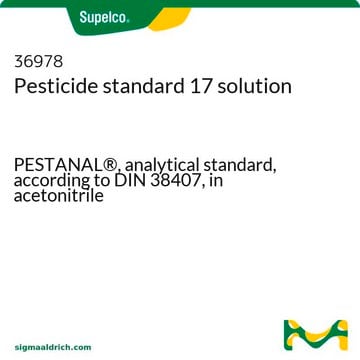45521
Glyphosate
PESTANAL®, analytical standard
Synonym(s):
N-(Phosphonomethyl)glycine, Glyphosate
About This Item
Recommended Products
grade
analytical standard
Quality Level
product line
PESTANAL®
shelf life
limited shelf life, expiry date on the label
technique(s)
HPLC: suitable
gas chromatography (GC): suitable
mp
230 °C (dec.) (lit.)
application(s)
agriculture
environmental
format
neat
SMILES string
OC(=O)CNCP(O)(O)=O
InChI
1S/C3H8NO5P/c5-3(6)1-4-2-10(7,8)9/h4H,1-2H2,(H,5,6)(H2,7,8,9)
InChI key
XDDAORKBJWWYJS-UHFFFAOYSA-N
Looking for similar products? Visit Product Comparison Guide
Related Categories
General description
Application
Legal Information
Signal Word
Danger
Hazard Statements
Precautionary Statements
Hazard Classifications
Acute Tox. 4 Dermal - Aquatic Chronic 2 - Eye Dam. 1
Storage Class Code
11 - Combustible Solids
WGK
WGK 2
Flash Point(F)
Not applicable
Flash Point(C)
Not applicable
Personal Protective Equipment
Choose from one of the most recent versions:
Already Own This Product?
Find documentation for the products that you have recently purchased in the Document Library.
Customers Also Viewed
Articles
Glyphosate and related compounds are measured in oatmeal and infant cereal using ion-exchange polymer-based particles for HPLC and SPE. Low level detection was obtained.
Glyphosate analysis: LC-MS/MS method with Supel™ Carbon LC U/HPLC column for stability and retention.
Glyphosate analysis: LC-MS/MS method with Supel™ Carbon LC U/HPLC column for stability and retention.
Glyphosate analysis: LC-MS/MS method with Supel™ Carbon LC U/HPLC column for stability and retention.
Protocols
EPA Method 547 outlines the analysis of glyphosate in drinking water by direct aqueous injection HPLC, post column derivatization, and fluorescence detection
Protocol for LC/MS Analysis of Glyphosate and Metabolites on apHera™ NH2, 2 mm I.D. Column
Our team of scientists has experience in all areas of research including Life Science, Material Science, Chemical Synthesis, Chromatography, Analytical and many others.
Contact Technical Service













